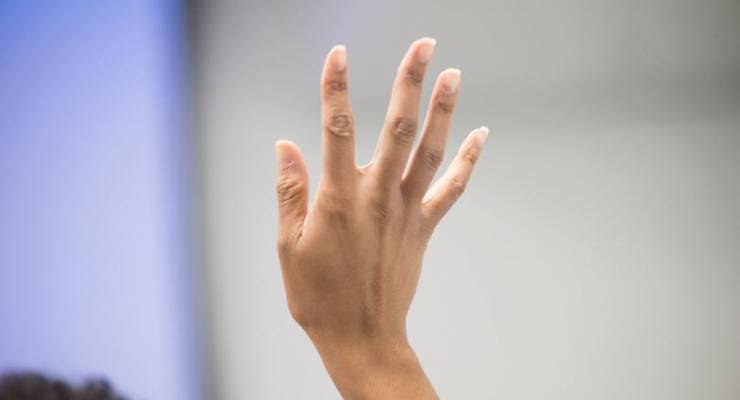
The stories that garnered the most interest over the weekend had a common theme: underqualified people loudly pushing their views on others! Below are some responses from Crikey members to the frustration of festival audience questions, and the unravelling of One Nation.
No, the irony of running a comments section on the worth of live audience Q&As is not lost on us.
On killing the audience Q&A
Sally Goldner writes: As someone who is both a speaker and a facilitator on different occasions, I appreciated the article and the varied comments. I would add one more re how the question is asked.
If people genuinely don’t understand something, the only way to move to understanding is ask. Therefore, as facilitator, I will encourage people to ask questions from that perspective, and ask them respectfully rather than belligerently.
This happened when as a speaker, I (a trans woman) was on a panel on trans issues. An audience member asked — respectfully — about trans people and toilets. Yes, as a trans person I find this topic annoying and the issue is without foundation. But the respectful asking did give us a chance to put a firm rebuttal on the record (and as the panel was being recorded, on the record for all time).
A good facilitator will prepare well, have empathy for what messages the panelists want to convey, and the panel discussion itself will achieve that. It will then follow naturally that the Q&A can achieve it as well.
John Filewood writes: Thank you for this discussion. It is not an easy one to solve for everyone’s proclivities. Everything said in the article is true to some degree. I love Marieke Hardy’s expressions.
My difficulty with the ABC Q&A program is the banal, ill-informed, racist or misogynistic comments made through the Twitter feed with no responsibility (in many cases) possible for the writer of the comment.
Sharman Grant writes: Three years ago I was at a session with Elizabeth Harrower as the guest. An “intellectual” in the audience asked the poor author a question that took about five minutes to ask and said the word “interiority” about three times. The poor woman could not understand the question and neither could anyone else. Why do the organisers do this?
Michael Buky writes: I could not disagree more. The few Q&As I listen to on RN usually provide a left-field angle to the topic/guest that are most enlightening. Hey, you’re in the media spotlight, however dim it may be — if you are unable to adlib or extemporise an interesting or entertaining response, perhaps you should consider submitting to a newspaper interview. With the live interviewer/presenter limited and focused tightly, frankly, I wouldn’t mind Q&As extended.
Chilla Bulbeck writes: It was so good to find out that intelligent people who run and participate in writers’ festivals agree with me — most questions hurl an uplifted audience down into the doldrums. Privileged upbringings are capable of producing the same “what I have to say is fascinating and original” approach of so many who offer their opinions.
Maybe Benjamin Law’s idea of seeking input from non-white members of the audience can be widened and used on every occasion. “If you are part of a minority in either society at large or this audience in particular, we want to hear from you first.”
In fact, questions from people with experiences other than my own are often enlightening, although not always.
On One Nation
Martin Butterfield writes: The article about One Nation was interesting. However IMHO it, like a similar analysis by the ABC — catalysed by Burston spitting the dummy — seems to attach too little weight to one aspect of One Nation: the astonishing ability of Hanson to attract senior advisers with extremely abnormal attitudes.
In the first go ’round that was David Oldfield while now it is James “who shot the speaker” Ashby. Far be it from me to say that Hanson is not an egotistical fruit loop but with those two pulling her strings her own abilities to pick losers will get magnified. Any analysis of One Nation that doesn’t give those people their due credit is flawed.
Desmond Graham writes: The shrinking middle class and the disenfranchised are looking for an alternative — but the alternative must have a modicum of brains combined, as Bernard says, with a policy agenda. Also the alternative cannot have an individual’s name [Hanson, Palmer] but an aspirational name. Something like Communism, Labor, Liberal, Republican, Democrat etc. The leader, as previously mentioned, must have a combination of brains and street smarts combined. The present parties have no noticeable differences in policies and are just replicating themselves for office holders without community input.
Stephen Alomes writes: It would be good if more journos and political scientists appreciated the characteristics of populism. Populist movements are “expressive” not “instrumental”; they know the things they are unhappy with (and not just race/immigration, a false swipe much of the time), but have no clear ideas re policy solutions.
Unfortunately, the charismatic leader, who is the saviour, holding them together, is flawed. And then there are the problems of incompetence, corruption, personalities and then defections in these unstructured parties and movements. See the ON/PHON history and European populist groupings.
Send your comments, corrections, clarifications and cock-ups to boss@crikey.com.au. We reserve the right to edit comments for length. Please include your full name.







Crikey is committed to hosting lively discussions. Help us keep the conversation useful, interesting and welcoming. We aim to publish comments quickly in the interest of promoting robust conversation, but we’re a small team and we deploy filters to protect against legal risk. Occasionally your comment may be held up while we review, but we’re working as fast as we can to keep the conversation rolling.
The Crikey comment section is members-only content. Please subscribe to leave a comment.
The Crikey comment section is members-only content. Please login to leave a comment.